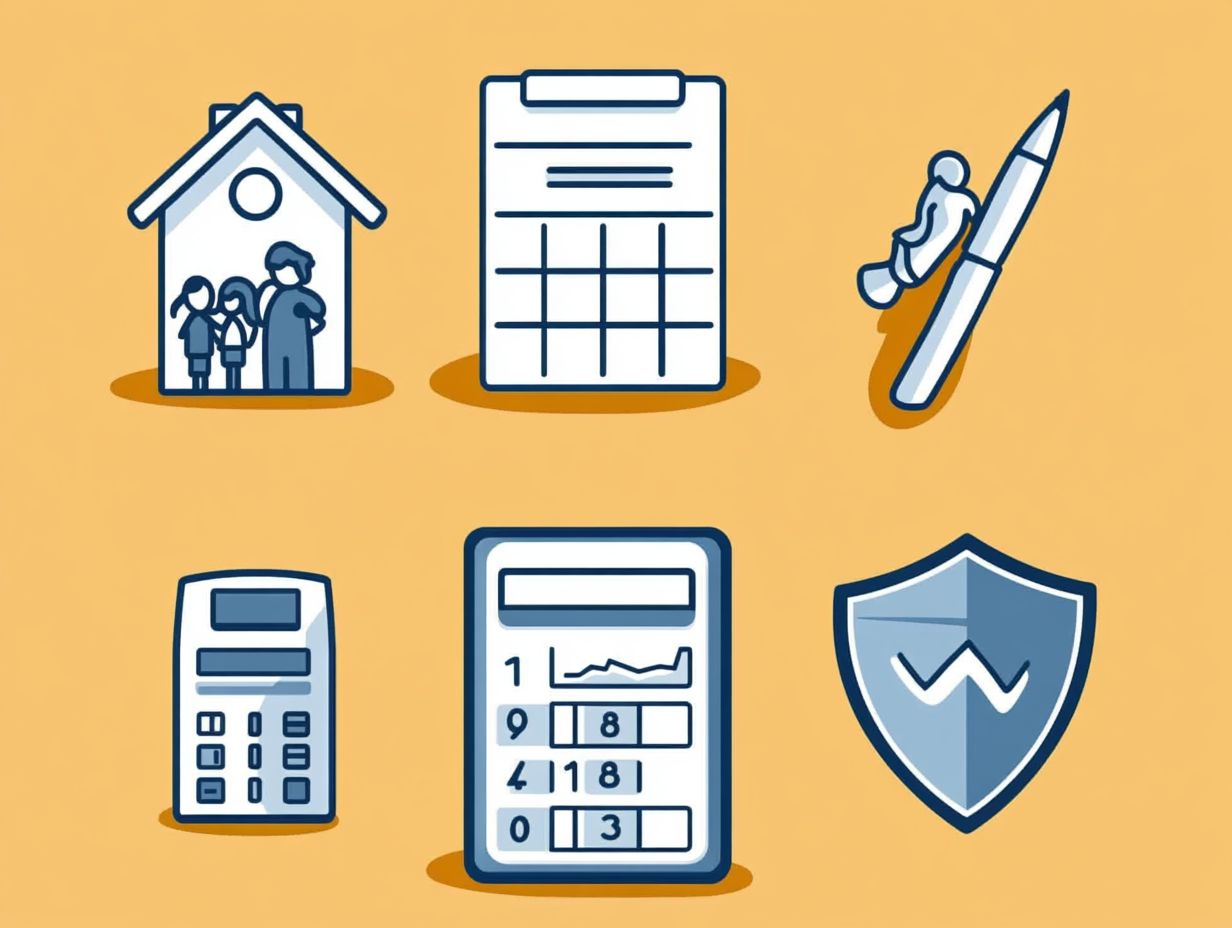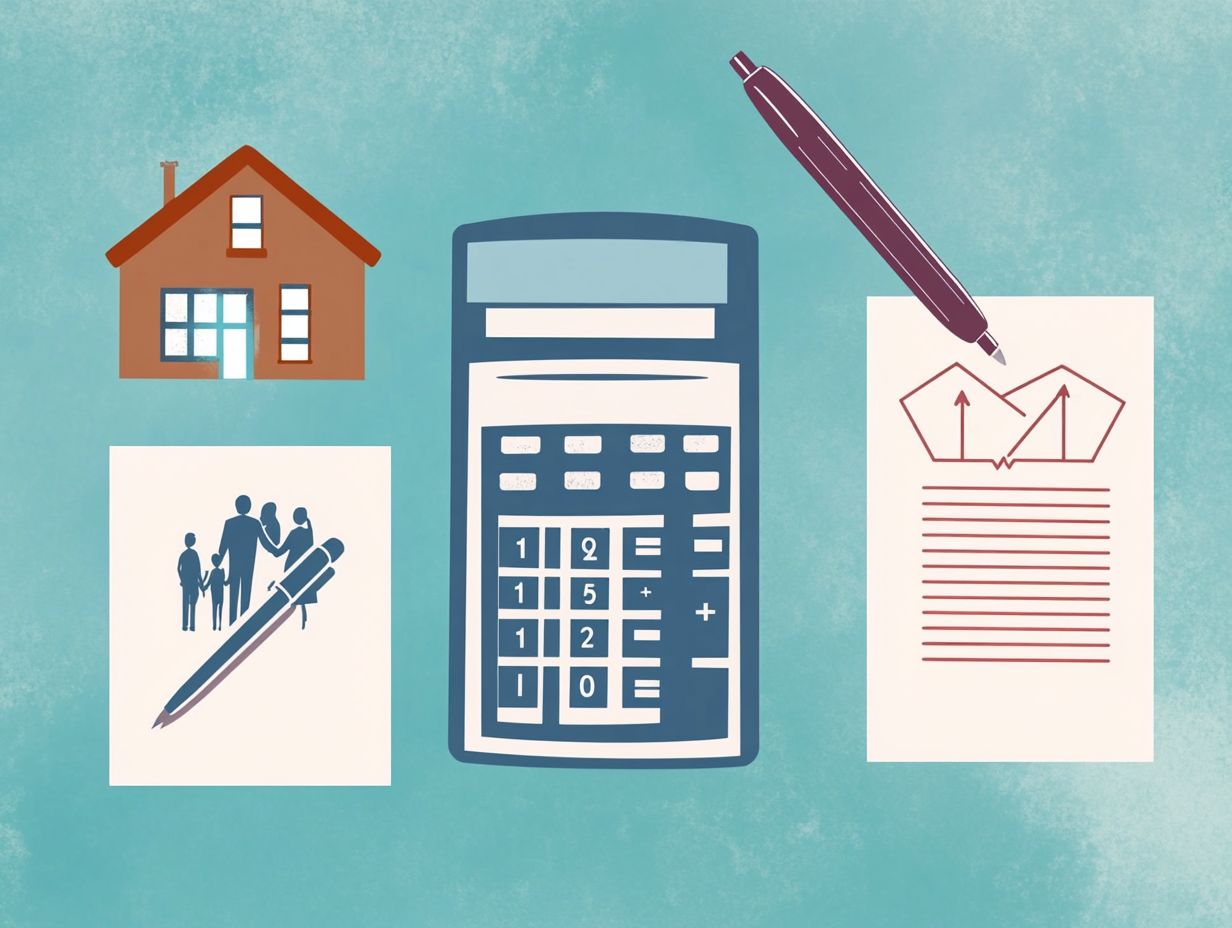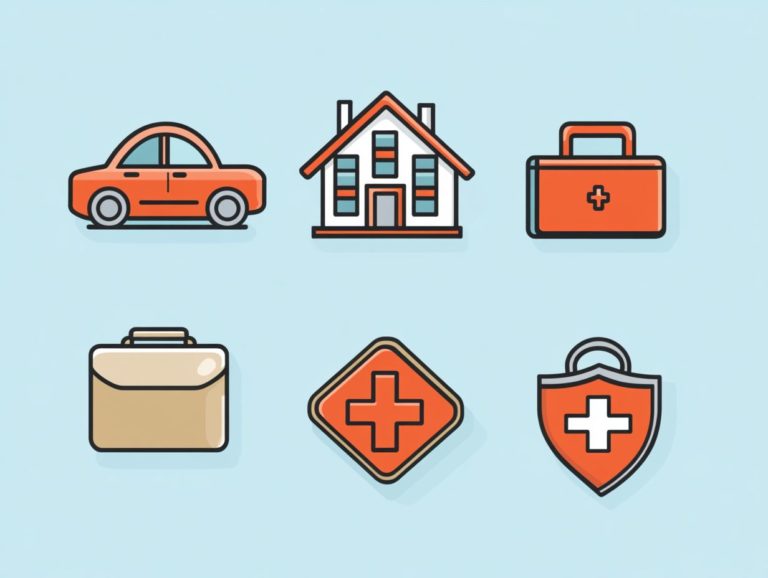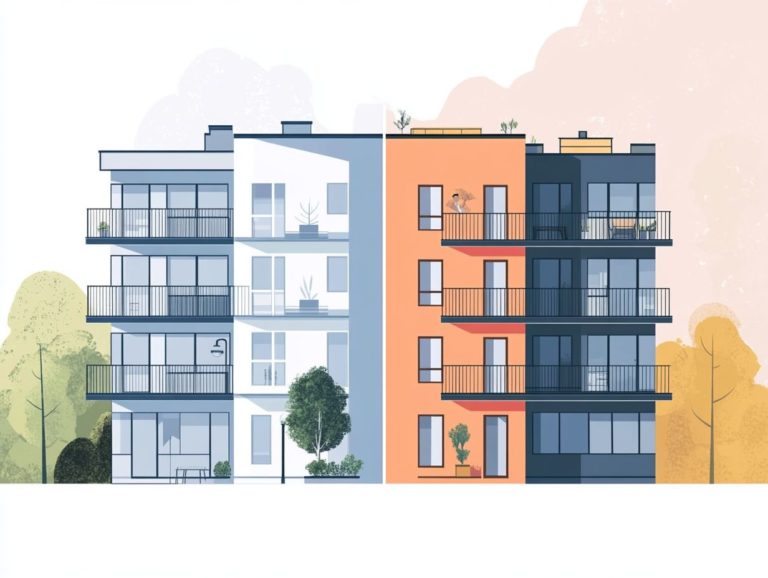5 Factors Influencing Home Insurance Choices
Choosing the right home insurance can feel overwhelming. Knowing the key factors can simplify your decision.
Consider how your home’s location, age, and condition affect your coverage options and premiums. This guide highlights five essential factors to help you make informed choices.
Whether you re a first-time homeowner or reviewing your current policy, this information will guide you confidently through your options.
Contents
- Key Takeaways:
- 1. Location
- 2. Age and Condition of the Home
- 3. Type of Coverage
- 4. Personal Factors
- 5. Cost of Premiums
- How Can a Homeowner Determine the Best Insurance Coverage for Their Home?
- What Are the Different Types of Home Insurance Coverage?
- How Can a Homeowner Save on Home Insurance Premiums?
- What Are Some Common Mistakes to Avoid When Choosing Home Insurance?
- How Can a Homeowner Ensure They Have Adequate Coverage?
- What Are Some Additional Factors to Consider When Choosing Home Insurance?
- Frequently Asked Questions
- What are the 5 factors that influence home insurance choices?
- How does location affect home insurance choices?
- What role does home value play in home insurance choices?
- Why are coverage needs an important consideration for home insurance choices?
- How does the deductible amount impact home insurance choices?
- Does the insurance provider influence home insurance choices?
Key Takeaways:

Location is crucial for insurance premiums. Areas prone to natural disasters or high crime rates often have higher rates.
Older homes or those with high-risk features may need more coverage. Personal factors like credit score and claims history also play a role.
1. Location
Your home’s location is key to your insurance rates. Insurance companies assess risks tied to geographic areas, such as natural disasters, and knowing 5 ways to save on home insurance premiums can help you manage costs effectively.
Regional risks like flooding and wildfires also shape your coverage and costs. For example, homes near coastlines may face higher premiums due to hurricane risks, and understanding 5 things you didn’t know about home insurance can help you navigate these factors better.
State regulations impact how insurers set their rates. Explore online resources to compare insurance rates across regions and empower yourself to make smart decisions.
2. Age and Condition of the Home
The age and condition of your home are vital in choosing the right coverage. Older homes may need extra dwelling coverage and specific add-ons, including the must-have features in home insurance policies.
Your insurer might require a property inspection to assess its condition. This helps identify risks and adjust your coverage accordingly.
The choice of building materials can affect your insurance costs. Homes with durable materials often enjoy lower premiums.
Fluctuating construction costs can impact your coverage needs. Insurers might offer discounts for upgrades that enhance safety and longevity.
3. Type of Coverage
Understanding the types of homeowners insurance is essential. Different policies offer varying levels of protection.
You’ll weigh the benefits of basic, broad, and special coverage. Basic forms cover essential risks like fires and theft.
Broad forms include additional perils, while special forms cover a wider range but may have exclusions. Assess your needs carefully.
Enhance your policy with add-ons for valuable items or higher liability limits to tailor insurance to your lifestyle.
4. Personal Factors

Personal factors like your credit history and claims history significantly impact your homeowners insurance premiums. Insurers use an insurance score to assess risks and identify potential discounts to help lower your costs.
Be proactive in managing your finances. A strong credit score can reduce premiums, while frequent claims may increase your rates.
To optimize your deductible, examine your financial situation and risk tolerance. It’s essential to find a balance between affordability and adequate coverage.
Don t overlook discounts insurers offer. Savings can come from bundling policies or having safety features in your home.
Also, think about unique factors, like service animals or attractive nuisances, as they can affect your liability and overall insurance needs.
5. Cost of Premiums
The cost of homeowners insurance can vary based on several factors. These include average rates in your area, your claims history, and risks related to your home and its location.
Understanding these elements is crucial for homeowners seeking the best rates. Gather quotes from multiple providers and consider 5 tips for selecting home insurance types to see how local statistics impact pricing.
Home renovations like a new roof or upgraded security can also affect premiums. Investing in such improvements not only increases your property’s value but may lead to lower insurance rates.
Carefully consider these connections when evaluating your coverage options.
How Can a Homeowner Determine the Best Insurance Coverage for Their Home?
Finding the best homeowners insurance coverage requires a thoughtful evaluation of your needs. Discussing options with insurance agents can help clarify the various products available for your specific risks.
Start by reviewing your existing policy to identify any coverage gaps. Understanding your options, from liability protection to personal property safeguards, is essential.
Explore online resources for insights into industry standards. Don’t overlook the expertise insurance agents offer; they can guide you through these complexities.
This way, you’ll select a policy that fits your needs and financial situation perfectly.
What Are the Different Types of Home Insurance Coverage?
You have many options for home insurance coverage. Dwelling coverage protects your home’s structure, while liability protection covers unforeseen accidents.
Consider endorsements or riders for additional safeguards. For example, flood insurance can tailor your policy to your unique needs.
Standard liability coverage provides crucial protection for injuries on your property, shielding you from hefty legal costs. Endorsements can fill gaps that typical policies might miss.
If you live in a flood-prone area, adding flood insurance is wise. This ensures you’re protected from water damage that standard policies may not cover.
How Can a Homeowner Save on Home Insurance Premiums?

You can save big on your home insurance! Explore various discounts, adjust your deductible limit (the amount you pay out of pocket before insurance kicks in), and maintain a positive claims history while enhancing your home safety measures.
Implementing specific strategies can help reduce your costs even further. For instance, bundling your home and auto insurance can lead to significant savings, as many providers offer discounts for this combined coverage.
Investing in improved home security features, like alarm systems or deadbolt locks, can also lower your premiums since insurance companies appreciate the reduced risks.
Regularly reviewing your coverage limits ensures you aren t over-insured or under-insured, allowing you to tailor your policy to your needs effectively.
Common discounts include having smoke detectors, being claims-free, and loyalty discounts for long-term customers.
What Are Some Common Mistakes to Avoid When Choosing Home Insurance?
Choosing homeowners insurance can be a minefield filled with potential pitfalls. Common mistakes include underestimating coverage limits and glossing over the specifics of policies. To avoid these issues, consider exploring 5 ways to lower home insurance rates.
Don t neglect to consider your claims history, which can significantly impact your future financial decisions. It s easy to dive into selecting a policy without scrutinizing the fine print, leading to misunderstandings about coverage.
Many individuals overlook the importance of shopping around for competitive rates and comprehensive plans tailored to their needs, mistakenly assuming all coverage is created equal.
Failing to communicate honest details about your property and lifestyle can leave you with inadequate protection. Take time to read through policy details, ask questions about unclear terms, and compare multiple quotes.
This way, you can make informed choices that truly safeguard your home.
How Can a Homeowner Ensure They Have Adequate Coverage?
To ensure you have adequate homeowners insurance coverage, conduct a thorough risk assessment and schedule regular home inspections. Adjust your dwelling coverage and limits as your needs evolve.
This proactive approach is crucial for identifying changes in your household or property that could impact your overall risk profile. Renovations, new valuables, or shifts in your neighborhood can significantly influence the protections you require.
By regularly reviewing your policy, you can avoid being underinsured, preventing potential financial strain in the event of a loss.
Engaging with insurance professionals can offer invaluable insights, helping you understand your unique needs and tailor your policies for comprehensive coverage.
What Are Some Additional Factors to Consider When Choosing Home Insurance?
When selecting homeowners insurance, consider factors like how renovations might impact your property value and your potential liability protection needs. For guidance, check out these 5 tips for choosing a home insurance provider.
Be aware that significant renovations such as adding a deck or a pool can elevate your property s worth. This increase may necessitate a reassessment of your existing policy limits.
Constructing an expansive outdoor living area raises the risk of accidents, potentially requiring additional liability coverage.
If your renovation exposes individuals to risks, such as an unguarded construction site, it s essential to address those liability concerns proactively.
Engaging with an insurance professional for tailored advice based on your specific renovation plans will help you navigate these complexities confidently.
Frequently Asked Questions

What are the 5 factors that influence home insurance choices?
- Location
- Home value
- Coverage needs
- Deductible amount
- Insurance provider
How does location affect home insurance choices?
Location impacts home insurance options. Some areas are at higher risk for natural disasters or crime, leading to increased premiums. It’s important to consider 5 questions to ask when choosing home insurance providers to ensure you make an informed decision.
Proximity to emergency services and fire hydrants also influences rates.
What role does home value play in home insurance choices?
Home value is crucial for insurance decisions. It affects how much coverage you need to protect your property.
Higher-value homes require more coverage, resulting in higher premiums.
Why are coverage needs an important consideration for home insurance choices?
Coverage needs define the amount and type of protection a homeowner requires.
Factors include the home’s age, condition, personal belongings’ value, and potential liabilities.
How does the deductible amount impact home insurance choices?
A deductible is the amount you pay before your insurance starts.
A higher deductible can lower premiums but increases out-of-pocket costs during a claim.
Does the insurance provider influence home insurance choices?
Yes, the choice of provider is critical.
Researching and comparing companies helps find one with a good reputation and competitive rates.






